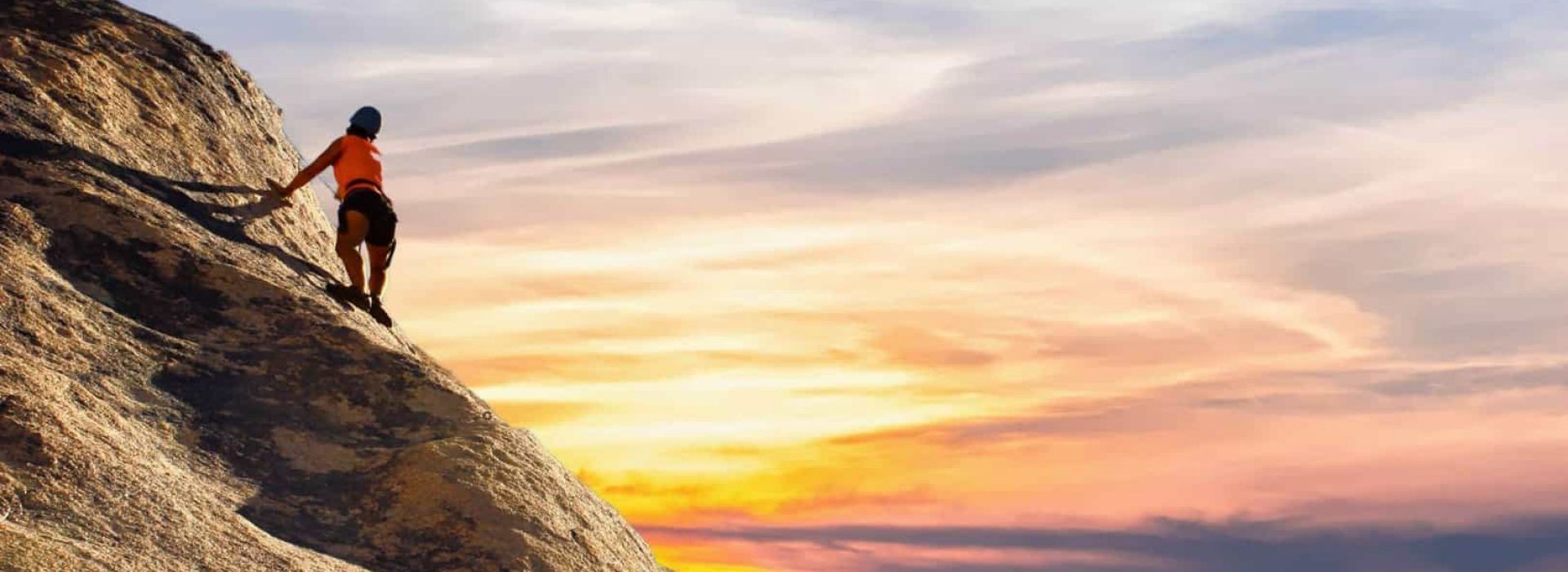The Benefits of Rock Climbing in Addiction Recovery

Rock climbing can be a great activity for people looking to recover from addiction. It can help in a number of ways:
- Physical exercise: Rock climbing is a physically demanding activity that can help to improve physical health and reduce stress.
- Mental challenge: Rock climbing requires concentration and problem-solving skills, which can help to distract from negative thoughts and cravings.
- Social support: Rock climbing can be a social activity, and participating in group climbs or joining a climbing club can provide a sense of community and support.
- Sense of accomplishment: Rock climbing can provide a sense of accomplishment and boost self-esteem, which can be helpful in recovery.
It’s important to note that rock climbing should be done under the supervision of trained professionals and with proper safety equipment. If you’re interested in using rock climbing as a tool in your recovery, it’s a good idea to speak with a healthcare professional or addiction counselor.
Rock Climbing and Mindfulness
Mindfulness is a mental state that involves being fully present and engaged in the present moment, without judgment or distraction. It is a technique that can be developed through various practices, such as meditation and deep breathing exercises.
Mindfulness can be helpful in addiction recovery in several ways. First, it can help individuals become more aware of their thoughts, feelings, and bodily sensations, which can help them identify triggers that may lead to substance use. By recognizing these triggers, individuals can develop strategies to avoid or cope with them.
Second, mindfulness can help individuals regulate their emotions and reduce stress. Substance use often occurs as a way of coping with difficult emotions, such as anxiety or depression. By developing mindfulness skills, individuals can learn to manage these emotions in healthier ways, reducing the need to turn to substances for relief.
Third, mindfulness can help individuals develop a greater sense of self-awareness and self-compassion. Addiction often involves feelings of shame, guilt, and self-criticism. By practicing mindfulness and self-compassion, individuals can learn to accept themselves as they are, without judgment or criticism, which can be a crucial step in the recovery process.
Overall, mindfulness can be an effective tool in addiction recovery, helping individuals develop the skills and awareness needed to manage their triggers, emotions, and self-talk in healthier ways.
Rock climbing can be a great way to practice mindfulness and be present in the moment. When climbing, it’s important to stay focused on the task at hand and not get distracted by other thoughts. This can help to improve concentration and clarity of mind.
Additionally, the physical and mental challenge of rock climbing can help to cultivate a sense of calm and control. By focusing on your breath and body as you climb, you can learn to manage your stress and emotions in a healthy way.
Rock climbing can be a great way to improve mental health and well-being. If you’re interested in incorporating mindfulness into your climbing practice, you may want to try incorporating techniques like deep breathing, body scans, and visualization into your climbs. It may also be helpful to work with a mindfulness coach or therapist to learn more about these techniques.
Rock Climbing for Anxiety
Rock climbing can be a wonderful way to manage anxiety and improve mental health. The physical and mental challenge of climbing can help to distract from anxious thoughts and provide a sense of accomplishment. The sense of control that comes with climbing can also help to reduce anxiety.
Additionally, the social support that can come from participating in group climbs or joining a climbing club can provide a sense of community and help to reduce feelings of isolation.
Rock Climbing for Depression
Rock climbing can be a helpful activity for managing depression and improving mental health, as it helps to distract from negative thoughts and provide a sense of accomplishment. The sense of control that comes with climbing can also help to improve self-esteem.
Additionally, the social support that can come from participating in group climbs or joining a climbing club can provide a sense of community and help to reduce feelings of isolation, which can be common in depression.
Addiction Recovery and Rock Climbing in Boulder, Colorado
Boulder, Colorado is home to a number of great rock climbing areas. Here are a few popular options:
- Boulder Canyon: Located just outside of Boulder, this canyon offers a variety of climbing routes ranging from easy to difficult.
- Eldorado Canyon State Park: Located south of Boulder, this state park is home to over 500 climbing routes and is popular with climbers of all levels.
- Flagstaff Mountain: Located just west of Boulder, this mountain offers a mix of sport and trad climbing routes.
- The Flatirons: These iconic rock formations just outside of Boulder offer a variety of climbing routes ranging from easy to difficult.
There are also a number of climbing gyms in the Boulder area where you can practice your skills indoors. If you’re new to climbing and want to try it out, it’s a good idea to take a beginner’s climbing course or work with a climbing instructor to learn the basics and stay safe.
Climbing Gyms Near Boulder, Colorado
Here are a few climbing gyms in the Boulder, Colorado area:
- Movement Climbing + Fitness: This gym features over 25,000 square feet of climbing terrain and offers a variety of climbing classes for all levels.
- The Spot Bouldering Gym: This gym features over 15,000 square feet of bouldering terrain and offers a variety of climbing classes and training programs.
- Earth Treks Climbing and Fitness: This gym features over 50,000 square feet of climbing terrain and offers a variety of climbing classes and training programs.
- ABC Kids Climbing: This gym is specifically designed for kids and features over 5,000 square feet of climbing terrain.
It’s a good idea to call ahead or check the gym’s website to confirm their hours and any COVID-related restrictions or guidelines.
Interested in our nature-based programing for addiction recovery? Give us a call for a free consultation.

